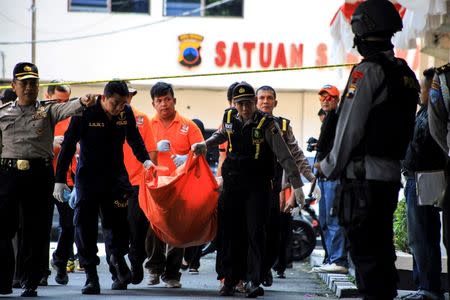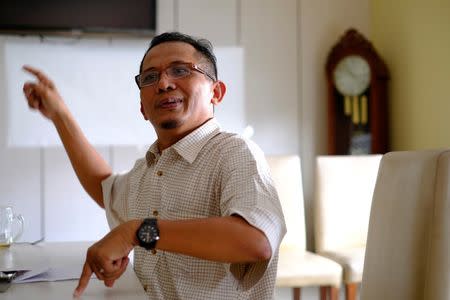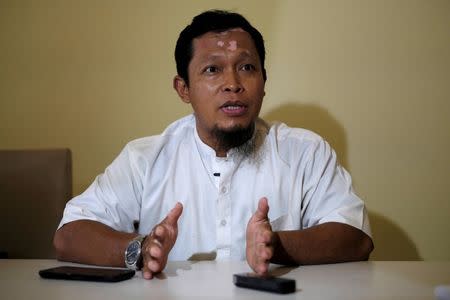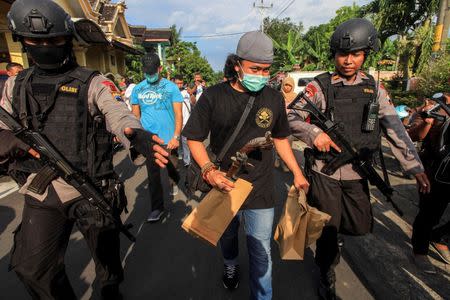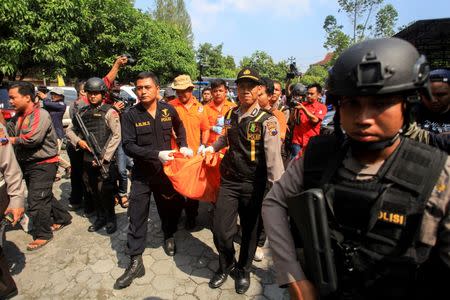Indonesia's most-wanted awakens new generation of jihadis
By Randy Fabi and Kanupriya Kapoor SOLO, Indonesia (Reuters) - During a May 2011 shootout, Indonesia's counter-terrorism forces killed the leader of a militant group thought to be behind a series of failed bomb attempts around the city of Solo in Central Java. The death of "Team Hisbah" founder Sigit Qurdowi caused the group to splinter. Some formed an anti-vice squad in the city; many others became associated with a former Solo resident called Bahrun Naim, who authorities believe is a leading Indonesian coordinator for Islamic State (IS). Now, five years later, Naim, based in IS's stronghold of Raqqa, Syria, is building an ever-more sophisticated network of militants from his former hometown, according to police, self-proclaimed radicals and people who work with the militants in Solo. Solo, which has a long history of schools and mosques associated with radical Islamists, is a breeding ground for Naim's recruits, counter-terrorism officials say, and many of his lieutenants in Indonesia have come from Team Hisbah. As a result, authorities fear the risk of a major attack in Indonesia is growing. Islamist militancy in the world's most populous Muslim-majority nation has been contained since a crackdown on Jemaah Islamiyah - al Qaeda's franchise in the region - put hundreds of its leaders and followers behind bars in the mid-2000s. But like al Qaeda before it, IS is reviving a fragmented radical Islamist movement in Indonesia that has endured in various incarnations for the past century, authorities say. Nearly $800,000 (£605,693) has been transferred from foreign countries to fund radical Islamist groups in Indonesia since 2014, officials from Indonesia's financial transactions watchdog said at an international counter-terrorism conference in Bali in mid-August. It wasn't clear how much money has come from Naim, who police say is now Indonesia's most-wanted militant. Reuters contacted a man identified as Naim last November on the Telegram app, using details provided by one of his acquaintances. In that exchange, Naim said IS had "enough men in Indonesia to carry out an action, more than enough support. Just waiting for the right trigger." Reuters could not independently verify the man's identity or his assertions. "BOOMING MOVEMENT" Amir Mahmud, a former Afghan-trained mujahideen, started the Islamic State Supporters Forum in Solo (also known as Surakarta) in July 2014 to "accommodate the development" of a jihadist movement in Indonesia. Around 2,000 people showed up to one of its first gatherings at the Baitul Makmur Mosque, where many backed an Islamist caliphate in the Middle East, he said. "This is a spontaneous spiritual calling," said Mahmud, who is also an Islamic university lecturer. "Islamic State," he added, "is a booming movement." Mahmud said two of his sons left Indonesia to fight for IS in the Middle East, and one has since been killed. Indonesia does not prohibit citizens from supporting groups such as IS or fighting for them abroad. Police say they can arrest terrorism suspects only once they have committed a crime on Indonesian soil. "If there is a person who declares support for ISIS, that becomes preliminary evidence for police to investigate whether they are involved in terrorist groups or activities," Freddy Haris, the justice ministry's director-general for laws told Reuters. "If there is proof they are involved, then we proceed with (legal) action." Mahmud, who has not been charged in any militant plot, noted that contacting Naim online was not difficult. "Bahrun Naim created a website on detonation, and people can access that," he said, speaking in a small restaurant near the palace of the Solo sultan. That has been difficult, however, since the government has blocked blogs and websites linked to Naim. Security officials acknowledged that Naim continues to communicate with his recruits through social media and messaging apps. Edi Lukito, leader of an Islamic anti-vice squad called Laskar Umat Islam Surakarta (Surakarta Muslim Battalion) said he knew of regular bank payments Naim made to at least one young recruit in the city. "This young generation has an extraordinary passion for jihad and they want to carry guns quickly," said Lukito, who said he does not support IS. JAKARTA ATTACKS Although not a member of Team Hisbah himself, Naim was the liaison between IS and Hisbah members when he was running an Internet cafe in Solo, the Jakarta-based Institute for Policy Analysis of Conflict (IPAC) said. He disappeared in January 2015 after serving time in prison on a 2011 conviction for possession of ammunition and police believed he moved to Syria. Naim emerged from obscurity a year later, when police identified him as the mastermind of gun and bomb attacks in central Jakarta that killed eight people, including the four attackers. Since then, he's been linked to other thwarted attacks, including a foiled plot, led by Solo native Gigih Rahmat Dewa, to launch a rocket into Singapore's Marina Bay casino resort area, using a boat from the neighbouring Indonesian island of Batam.. Another member of Team Hisbah, counter-terrorism police told Reuters, was 31-year-old Nur Rohman. He blew himself up outside a police station in Solo in July, one of a series of attacks claimed by Islamic State across the world during the Ramadan fasting month, including the killings of foreigners at an upscale cafe in Dhaka just days earlier. JAVANESE CULTURE Nestled in the lush volcanic hills running down the spine of Java, the archipelago's most populous island, Solo is a hub of traditional Javanese culture, blending elements of Hinduism, Buddhism and animism. The city of 800,000 is the hometown of Indonesian President Joko Widodo and of the Solo royal family. Solo also has long been host to radical Islamist movements that take their inspiration from the Middle East. It is the hometown of Abu Bakar Bashir, the spiritual leader of Jemaah Islamiyah (JI), who is serving a 15-year sentence for helping to fund a militant training camp in Indonesia's staunchly Islamic province of Aceh. The city features dozens of Islamic boarding schools, including Bashir's al-Mukmin Ngruki. "The population of radical groups in Solo is already very high, so they are like raw material ready to be radicalised," said Solahudin, a leading authority on Islamic extremism in Indonesia. "It's easier to recruit people in Solo than in other places," said Solahudin, who like many Indonesians goes by one name. A dozen or so radical youth groups operate in the city, including bands of vigilantes, modelled after Saudi Arabia's religious police like Team Hisbah and the Surakarta Muslim Battalion, who raid the city's gambling dens, cafes, and brothels, security officials said. They became especially prominent after the fall of Indonesia's late strongman President Suharto in 1998, who had ruthlessly suppressed any sign of opposition from hardline Islamist groups. Agus Junaedi, who took over the vigilante wing of Team Hisbah after the death of its founder Sigit in 2011, insists the group only conducts anti-vice raids: "Nothing more than that." "Every time there is an arrest that involves terrorists, it is always linked to Hisbah in Solo," Junaedi, who runs a small store selling herbal medicines and Korans, complained. LACKING EXPERTISE Naim uses his contacts in Solo to look for people he believes can be easily radicalised, said a senior counter-terrorism official. "After online contact is established, he will teach them how to make bombs and give them tactical instructions on how to plan attacks," the official said. Naim's followers are not capable of mounting a major attack, said Mahmud of the Islamic State Supporters Forum. "They cannot get materials like in the Bali bomb," he said, referring to the 2002 bombings of night clubs in Kuta Beach, Bali that killed 202 people, most of them foreigners. "It was easy to access in the past, but it has been tightened." That could be changing. Last week, Indonesia's counter-terrorism force arrested a suspected militant with alleged ties to Naim. Authorities say he was planning an attack in Bali with the same kind of explosive material used in IS attacks in Paris last November and in Brussels in March. Police seize 150 grams of the peroxide-based explosive TATP (triacetone triperoxide), known as "the mother of Satan" in militant circles, in the raid. "They may look amateurish now," said the senior counter-terrorism official, when asked about the threat posed by Naim's network. "But the pattern in which they seem to be moving and organising themselves means it's only a matter of time before they can launch a dangerous attack." (Additional reporting by Agustinus Beo da Costa; Writing by Bill Tarrant; Editing by Alex Richardson.)

 Yahoo News
Yahoo News 